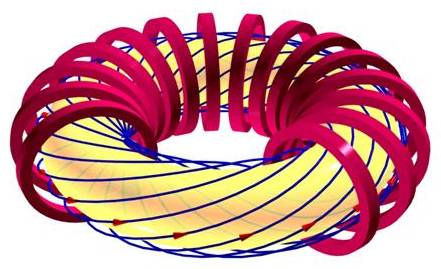Section: Application Domains
Controlled fusion and ITER
The search for alternative energy sources is a major issue for the future. Among others, controlled thermonuclear fusion in a hot hydrogen plasma is a promising possibility. The principle is to confine the plasma in a toroidal chamber, called a tokamak, and to attain the necessary temperatures to sustain nuclear fusion reactions. The International Thermonuclear Experimental Reactor (ITER) is a tokamak being constructed in Cadarache, France. This was the result of a joint decision by an international consortium made of the European Union, Canada, USA, Japan, Russia, South Korea, India and China. ITER is a huge project. As of today, the budget is estimated at 20 billion euros. The first plasma shot is planned for 2020 and the first deuterium-tritium operation for 2027.
Many technical and conceptual difficulties have to be overcome before the actual exploitation of fusion energy. Consequently, much research has been carried out around magnetically confined fusion. Among these studies, it is important to carry out computer simulations of the burning plasma. Thus, mathematicians and computer scientists are also needed in the design of ITER. The reliability and the precision of numerical simulations allow a better understanding of the physical phenomena and thus would lead to better designs. TONUS's main involvement is in such research.
The required temperatures to attain fusion are very high, of the order of a hundred million degrees. Thus it is imperative to prevent the plasma from touching the tokamak inner walls. This confinement is obtained thanks to intense magnetic fields. The magnetic field is created by poloidal coils, which generate the toroidal component of the field. The toroidal plasma current also induces a poloidal component of the magnetic field that twists the magnetic field lines (see Figure 2 ). The twisting is very important for the stability of the plasma. The idea goes back to research by Tamm and Sakharov, two Russian physicists, in the 50's.
Other devices are essential for the proper operation of the tokamak: divertor for collecting the escaping particles, microwave heating for reaching higher temperatures, fuel injector for sustaining the fusion reactions, toroidal coils for controlling instabilities, etc.



